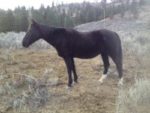Helping Hormonal Mares
We are back! After a few weeks of technical problems with the blog all is resolved and we are back to bringing you articles every week…Enjoy! 🙂
This article was featured in Riva’s Remedies March 2012 Newsletter and I wanted to share it with all of you. I’m sure we have all, at some point dealt with a moody mare! We have a very hormonal mare that greatly benefits from these herbal treatments. Hope this helps you too!
——————————————————-
Helping Hormonal Mares
By Marijke van de Water, B.Sc., DHMS
Many mares exhibit hormonal problems through mood and behaviour changes. This is often seen during a mare’s cycling days, however many mare owners report this behaviour even when they are not cycling. Unfortunately, too many times we have simply attributed this to “mares being mares”, and have not recognized that these horses are not feeling well and that they can suffer from the same anxiety, irritability, aggression, sadness and depression as women do during PMS or an unhealthy menopause. These emotional symptoms can make it very hard for mares to tolerate being handled or ridden, or to cooperate with other horses. And, unfortunately it often gets dismissed as a training problem.
Hormones are powerful chemicals that have a profound effect on the neurotransmitters of the brain: estrogen has an excitatory effect on the brain, increasing serotonin and acetylcholine levels whereas progesterone has a more calming effect. Serotonin is responsible for creating positive moods and acetylcholine is necessary for focus and memory.
As with humans, diet can be an important factor – high-sugar feed such as oats or sweet feed will exacerbate hormonal symptoms. Horse owners also report that high quantities of alfalfa can negatively affect behaviour as well. (For humans, caffeine and dairy products are the most common culprits with PMS and menopausal symptoms.)
For a hormone balancer and calmer the Riva’s Herbal Blend for Mares is an effective remedy. It contains Blue Cohosh, Black Cohosh, Licorice Root and Chamomile to tone the ovaries and sooth the nerves. This blend will also help to regulate erratic cycles, ease uterine cramping and/or to increase fertility – although it is not advisable to feed it during pregnancy.
The best nutritional supplements are Vitamin B6 (800 to 1,000 mg daily) and Riva’s Primrose Oil (4,000 mg daily).
Vitamin B6 is essential for the synthesis of both hormones and neurotransmitters and has the added benefit of regulating blood sugar levels. It will also support pituitary and thyroid function.
Riva’s Primrose Oil also helps to synthesize hormones, and is a natural anti-inflammatory and immune stimulant. Both of these nutrients can be used with the Herbal Blend for Mares and are also safe to feed during pregnancy.
If the thyroid or pituitary glands need extra support, use Riva’s Hormone+Boost to stimulate and tone the entire glandular system, to optimize metabolism, improve immunity, relieve stress, and enhance mental and emotional well-being. It contains Ashwaghanda, Chaste Berry, Kelp, Licorice Root and Raspberry Leaf.
Once the hormones are stabilized but a mare is still uncooperative then the training program should be assessed. Some horse owners have allowed their behaviour to become a pattern, in which case competent but compassionate handling will help them re-learn a healthier attitude. And don’t put food down in front of “cranky” mares until their ears come forward – this might take time at first but they will learn to “smile” to get fed. In fact, don’t let them eat at any time during handling or riding as many horses will consider this as dominance. With good food, supplements and common-sense handling most mares will become happy and healthy partners.
Some moody mares are simply trying to express that they want to have a baby, after which their hormones “settle down”. There are no guarantees though…and if you choose to breed make sure that you can provide the foal with a permanent home for life; we already have too many unwanted horses that end up in situations of neglect and/or abuse.
Click here to see this article in its entirety on Riva’s Rememdies Website: http://www.rivasremedies.com/hormonal_mares.php
Marijke van de Water, B.Sc., DHMS
Equine Health & Nutrition Specialist
Homeopathic Practitioner
Medical Intuitive & Healer
Author of two books:
Healing Horses: Their Way!
Healing People: The Marijke Method


